Fear of Boko Haram drives thousands to flee from Niger to Chad
DAKAR (Thomson Reuters Foundation) - Fear of Boko Haram attacks has driven at least 7,000 people from Niger to seek refuge in Chad in the last week, and thousands more may cross the border if the violence escalates, the United Nations said on Monday.
The recent arrivals in Chad’s Lake region felt compelled to leave Niger after attacks by Islamist Boko Haram militants on their village and neighboring communities in the southeastern Diffa region, according to the U.N. refugee agency (UNHCR).
Diffa has seen intense fighting over the past year between Niger’s army and Boko Haram militants. The region hosts almost a quarter-of-a-million uprooted people, from Niger and Nigeria, who have been forced to flee their homes by the violence.
“The new arrivals fled into Chad because they were scared of Boko Haram attacks … after a few took place recently,” UNHCR official Edward O'Dwyer told the Thomson Reuters Foundation.
“They also said they felt exposed after Chad scaled back the number of troops in Niger due to a lack of resources,” he added.
Those who crossed the border into Chad said at least 10,000 more people could follow suit imminently due to fears over their safety in southern Niger, according to the U.N. agency.
Suspected Boko Haram fighters killed nine people and abducted dozens more in southern Niger last month, while female bombers killed two and wounded 11 at a U.N.-managed camp for the displaced in the first suicide attack in the region in a year.
This violence has stoked fears about Niger’s inability to stop Boko Haram crossing the desert border from their bases in Nigeria, with the frequency of the militants’ attacks having ramped up recently as their eight-year insurgency rages on.
Their bid to carve out an Islamic caliphate in the Lake Chad region has killed 20,000 people and forced at least 2.7 million to flee their homes across Cameroon, Chad, Niger and Nigeria.
“We are concerned that if the security situation deteriorates in Niger, more and more people will flee to Chad,” said O'Dwyer, adding that the UNHCR had a contingency plan prepared to provide aid in case of a spike in arrivals.
The U.N. agency said it had delivered items such as plastic tarpaulin and blankets to those uprooted from Niger, who have set up an informal camp near a site hosting Nigerian refugees.
Chad’s Lake region is home to at least 100,000 Chadians uprooted by violence, and 8,000 Nigerian refugees, says the U.N. Office for the Coordination of Humanitarian Affairs (UNOCHA).
Reporting By Kieran Guilbert, Editing by Ros Russell; Please credit the Thomson Reuters Foundation, the charitable arm of Thomson Reuters, that covers humanitarian news, women’s rights, trafficking, property rights, climate change and resilience. Visit news.trust.org
Jhonel est un slameur nigérien. Il y a quelques années, il écrivait un slam sur les réfugiés à travers l’Afrique: « Je pars d’ici ». C’était avant que son pays en accueille à son tour. L’UNHCR Niger s’est rapproché de Jhonel, pour donner une place aux réfugiés nigérians et maliens dans son texte, et de la musicienne Laetitia Cécile afin qu’ils retravaillent ce slam en musique.
Au milieu du flot de vidéos, photos et autres articles de presse qui visent à rendre visible les problématiques des réfugiés mais qui se perdent dans la masse d’information, l’empathie est difficile. La musique est un autre levier. Nous laissons à vos oreilles le soin de vous toucher. Le 20 juin se célèbre la « Journée Mondiale des Réfugiés ».
Auteur et Voix: Jhonel
Compositeur et Piano : Laetitia Cécile
Mixage: David Octor
Source: SoundCloud / unhcrniger
African migrants risk all in Sahara to reach Europe
In a sandy compound in the Niger desert town of Agadez, a white-turbaned imam blesses a circle of African migrants, some of them little more than boys, to protect them on the journey across the Sahara toward Europe.
Read more
La famine, une menace de plus pour le Niger

Sécheresse, récoltes impossibles suite aux attaques des insurgés, éducation défaillante… Benoît Thiry, du Programme alimentaire mondial, alerte sur les risques humanitaires et sécuritaires aux alentours du lac Tchad. Deux millions et demi de personnes touchées par la faim : c’est l’estimation donnée par les autorités de Niamey. La précarité alimentaire touche ainsi une nouvelle fois les zones rurales et frontalières du bassin du lac Tchad. Le déficit céréalier, lié aux faibles pluies, comme en 2009 et 2010, est aggravé par l’afflux des réfugiés du Nigeria.
Pour lire l’intégralité de l’article cliquez ici
Advocacy for Niger by UN High Commissioner for Refugees Antonio Guterres
UN High Commissioner for Refugees, Antonio Guterres, took the floor last week in New York and advocated for “frontline states” that have to absorb refugee influxes from neigbouring countries, such as Niger
3 years of malian refugees - key events

Près de 3 ans pour les réfugiés maliens : chronologie des principaux évènements
En janvier 2015, cela fera 3 ans que le nord du Mali est entré dans une crise de laquelle il n’est toujours pas ressorti. De l’ouverture des camps à celle des Zones d’Accueil des Réfugiés, en passant par les espoirs nés des élections présidentielles maliennes jusqu’aux récentes attaques de Ouallam et Mangaize, cliquez sur le lien suivant pour revenir sur la chronologie des principaux évènements.
English version http://data.unhcr.org/SahelSituation/download.php?id=984
Version francaise http://data.unhcr.org/SahelSituation/download.php?id=985
| First Tripartite Commission Meeting holds in Bamako |
 | Première réunion de la commission tripartite entre le Mali, le Niger et le HCR le 12 juin à Bamako | Following the provisions of the first Tripartite Agreement on May 3, 2014 in Niamey for the voluntary repatriation of Malian refugees, the Tripartite Commission met for the first time on June 12 in Bamako. The commission which is charged with overseeing the implementation of favorable voluntary repatriation of Malian refugees adopted its internal rules and regulations and expressed its commitment to reinforce protection monitoring in northern Mali. This is in a bid to follow up on the ongoing peace and stability efforts and to ensure safety and dignity for returning refugees. When conditions would have been fully met in the future, “go and see visits” for refugees and “come and tell visits” for returnees and notables to enable the refugees take informed decisions would be facilitated. . |
 | Comme prévu par l'Accord Tripartite du 3 mai 2014 de Niamey sur le retour volontaire des réfugiés, la Commission Tripartite s'est réunie pour la première fois le 12 juin à Bamako. Cette commission qui veille à la mise en place des conditions favorables au rapatriement volontaire des réfugiés maliens, a fixé son règlement intérieur, et s'est engagée à renforcer le monitoring de protection au Nord Mali. Ceci afin de suivre les efforts de stabilisation pour assurer un retour dans la dignité et la sécurité des réfugiés. Il est notamment prévu à l'avenir, lorsque les conditions seront réunies, d'organiser des visites entre les camps au Niger et les zones de retour au Mali (go-and-see visits, come and tell visits) pour renforcer l'information des réfugiés avant de prendre leur décision |
|---|
Diffa refugees feature on CNN alongside UNHCR’s partner, the International Rescue Committee
All that 14-year-old Bintou and her little sister Ma'ou, 12, have of their former life in Nigeria are tattered photos of their parents.
Bintou curls up and buries her face, her shoulders shuddering with each silent sob. Ma'ou seems to have utterly internalized her pain, and speaks in a numb monotone.
They tell us they want to go back to Maiduguri, but for now they can’t.
They are orphans – their mother died of natural causes before they can remember, and their father was killed in a Boko Haram attack about five months ago. We find them living with their aunt on a small plot in Diffa, Niger, uncertain about a future they are now forced to navigate alone.
Source :http://edition.cnn.com/video/data/2.0/video/world/2014/06/09/pkg-damon-nigeria-orphan-boko-horam.cnn.html
L’UNHAS: un maillon essentiel dans la chaîne de l’aide … et peut être plus.
Le United Nations Humanitarian Air Service (UNHAS) est un service aérien mis en place le Programme Alimentaire Mondial (PAM)dont le mandat et de gérer l’ensemble du transport aérien (passagers et cargo) pour les activités humanitaires et les programmes de développement. Présent au Niger depuis 2008, l'UNHAS est bien plus qu’un simple soutien aux opérations, c’est un maillon essentiel de la chaîne humanitaire et de développement. Son service va peut-être même au-delà.
Lire plus

| Mali, Niger and the UNHCR sign agreement on repatriation of Malian refugees |
 | Le Mali, le Niger et le HCR signent un accord sur le rapatriement des réfugiés maliens | On 3 May 2014, the governments of Mali, Niger and UNHCR signed the tripartite agreement for the voluntary repatriation of Malian refugees. UNHCR welcomes the conclusion of this agreement which provides a legal framework to support spontaneous returns already underway since 2013 and which provides additional protection to returnees. |
 |
Le 3 mai 2014 les Gouvernements du Mali, du Niger, et le HCR ont signé l’accord tripartite pour le rapatriement volontaire des réfugiés maliens. Le HCR se réjouit de la conclusion de cet accord qui offre un cadre juridique pour accompagner les retours spontanés déjà amorcés depuis 2013, et qui apporte une protection supplémentaire aux rapatriés. |
|---|

De droite à gauche, les représentants du HCR, du gouvernement nigérien et du gouvernement malien procédant à la signature de l'accord. ©UNHCR/A.Belaskri

